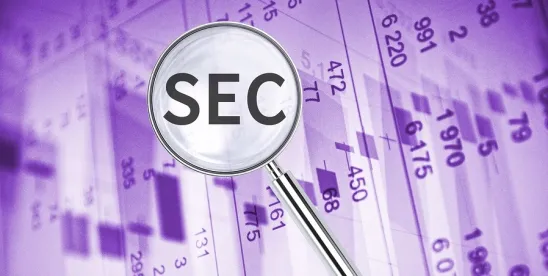On July 25, 2017, the U.S. Securities and Exchange Commission (“SEC”) issued a report (“Report”) detailing its investigation into whether the DAO (an unincorporated “decentralized autonomous organization”), Slock.it UG (“Slock.it”), Slock.it’s co-founders, and intermediaries violated the federal securities laws. The SEC determined that the tokens issued by the DAO are securities under the Securities Act of 1933 (“Securities Act”) and the Securities Exchange Act of 1934 (“Exchange Act”), and advised those who would use a distributed ledger or blockchain-enabled means for capital raising to take appropriate steps to comply with the U.S. federal securities laws. However, the SEC decided not to pursue an enforcement action at this time.
The SEC has been watching the increase in ICOs for some time, and for good reason. The New York Times reported that $1.1 billion has been raised this year by companies, foundations, and decentralized autonomous organizations selling digital coins or tokens that are created and disseminated using distributed ledger or blockchain technology. Nearly all of these token sales have been characterized by their promoters as the sales of digital assets or currencies, rather than as the sale of securities, and have not been registered as securities in the United States.
Legal experts watching the ICO phenomena have been wondering and debating whether some of these digital tokens might have sufficient utilitarian function that their sale would not constitute the sale of securities. As a hypothetical example, imagine that in 1960, IBM wanted to develop and manufacture a new mainframe. Rather than sell more shares in IBM, it decides to sell 1 billion punch cards for $0.10 each and use the $100 million raised to pay for the development and manufacturing of the mainframe. Buyers of the punch cards could then use their punch cards to operate the mainframes. Hopefully, the value of those computations would exceed $0.10 for each punch card used. If so, the buyers could sell the punch cards at a profit.
Is the punch card a security? Many companies that have sold tokens in ICOs have taken the position that their tokens are more like punch cards, and merely the pre-sale of useful articles that will permit operation of the blockchain platform they have built or have yet to build.
The SEC did not give guidance or pursue an enforcement action that would clarify when tokens might possess sufficient utilitarian qualities such that their sales do not require compliance with U.S. securities law. Instead, focusing on the DAO, the Report identifies a particular set of circumstances that the SEC believes causes the token sale to constitute a sales of securities under U.S. securities law.
There are a number of interesting findings and conclusions in the Report:
-
The SEC had no trouble at all in determining that Slock.it was the promoter of the DAO and its tokens. As evidence of this, the Report states that Slock.it’s founders launched a website to describe and facilitate the DAO token sale, solicited media attention by posting updates on websites on online forums, communicated to the public about how to participate in the DAO token sale, and retained the right to choose the “curators” that would determine what proposals to put to a vote by DAO token holders.
-
In applying the “Howey” test (SEC v. W.J. Howey Co., 328 U.S. 293, 301 (1946) as restated in SEC v. Edwards, 540 U.S. 389 (2004)), the SEC found that the DAO’s investors relied on the managerial and entrepreneurial efforts of Slock.it, its co-founders, and the DAO’s curators to manage the DAO and generate profits. This was sufficient to satisfy the element of the Howey test requiring that the profits would be derived from the entrepreneurial or managerial efforts of others, separately from the efforts of the investors.
-
The SEC did not analyze the question whether the DAO was an “investment company,” that would fall under Section 3(a) of the Investment Company Act of 1940. However, the SEC states in the Report, “[t]hose who would use virtual organizations should consider their obligations under the Investment Company Act.”
-
The SEC reviewed recordings of Slock.it’s demonstrations and presentations at technology conferences to determine that the DAO was intended to be for-profit, and that the tokens were likened to “buying shares in a company and getting ….dividends.” Examination of these kinds of records and materials is not surprising to attorneys that deal with SEC investigations. However, it may come as news to entrepreneurs that think their ICO whitepaper will be the sole, definitive document characterizing their tokens.
-
The SEC fired a warning shot to exchanges where tokens are traded. The SEC found that the exchanges that traded DAO tokens appear to satisfy the criteria for a trading system of securities regulated under the Exchange Act, which makes it unlawful for any exchange to effect any transaction in a security unless the exchange is registered as a national securities exchange or is exempted from such registration.
-
If anyone had any doubts, the Report makes it very clear that whether a token sale is called an “ICO” or is coded in a smart contract will do little affect the SEC’s analysis into whether it constitutes the sales of securities.
The Investor Bulletin on Initial Coin Offerings.
Concurrently with the Report, the SEC issued an Investor Bulletin on Initial Coin Offerings(“Bulletin”) to make investors aware of potential risks of participating in token sales, often referred to as ICOs. The Bulletin was issued by the SEC’s Office of Investor Education and Advocacy, with the objective of making investors aware of the potential risks of participating in ICOs. The Bulletin is neither a legal interpretation nor a statement of SEC policy.
As a reader of the Report would expect, the Bulletin states that, “[d]epending on the facts and circumstances of each individual ICO, the virtual coins or tokens that are offered or sold may be securities.” Of course, this also means that depending on the facts and circumstances of each individual ICO, the virtual coins or tokens that are offered or sold may not be securities.
The Bulletin also includes a list of points to consider when purchasing tokens in an ICO. These points are grounded in decades of SEC experience dealing with securities fraud.



 />i
/>i

